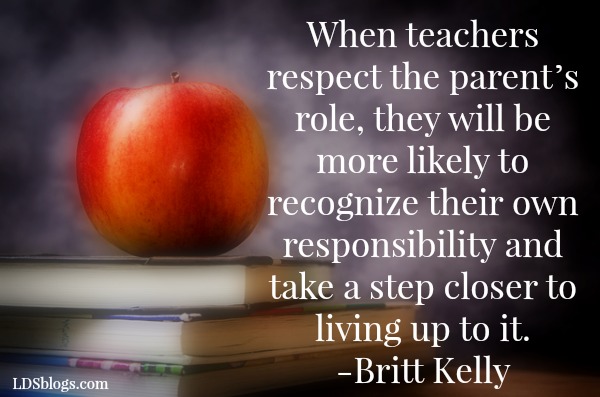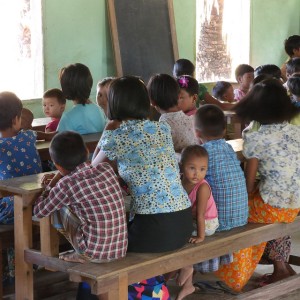Recently I saw a clip and read a transcript of Hillary Clinton calling education the “most important non-family enterprise”. I saw a slideshow of students communicating with their teachers about what they wished their teachers knew-in most cases it was about their homes and family and the struggle there. Another quote crossed my desk: “The classroom teacher is the single most significant contributor to student achievement. Teachers have a greater impact than parents, peers, schools, and even poverty.” Eric Jensen, renowned educator and author of “Engaging Students with Poverty in Mind: Practical Strategies for Raising Achievement.”
The underlying theme of all three quotes is that it is normal to educate a child independent of the family. I’m not denying it’s possible, but it is very difficult. Education is a cooperative endeavor.
If we put aside the obvious effects of home stability, nutrition, and early education, there are many ways in which we need a cooperative home and school effort.
Cooperation between a teacher and parent is essential.
Parents are the experts on their own children. They have years of unique experience with the child. They know their medical situation, their personalities, their past and environment. They see things that a teacher in a classroom could never see.
A teacher has unique training. She has a level of distance from the child that can be beneficial. They may see strengths or weaknesses that a parent may take as normal. The teacher sees the child in a new environment that allows them a different perspective on their behavior.
Combining the efforts of a teacher and parent can strengthen the education possibilities for the child when each perspective is respected. This must not be a competitive arrangement. This is an opportunity to have more people invested in encouraging the child to learn. Communication is the key to use the strengths of the teacher and the parent to help the child. When we have to call one another to report issues, or get assistance with problem behaviors, always start with positive statements. Make sure the teacher or parent knows you see the whole person, not just the problem. I know my children aren’t perfect, but anyone who can’t see anything good about them…I question their judgement and vision. A balanced, respectful conversation is most likely to lead to a cooperative effort between teacher and parent.
Reading, no substitute for home.
Study after study indicates that a child with parents who read, will read. A child who is read to as a child is more likely to succeed in all of school. There can be free reading at school, but there is nothing like reading before bed, or snuggling with a book under a blanket during a thunderstorm. At home books can be just for fun. There aren’t deadlines, or book reports or analysis. A book is a way to escape, learn, and be entertained. Life long readers read for fun.
I have had some great teachers who clearly loved to read. One teacher had a wall sized mural from her favorite book. Another teacher read aloud to us and I hear still Ma from little house in her voice. I also was disciplined for reading a book when I was done with my work. Many times.
But nothing beats coming home and seeing my mom reading. Going on vacation and having my dad put his box of Louis L’Amour books in the back of the car. They spoke about great books, recommended books to us. We children still recommend books to each other on occasion.
Homework.
I’ve said it before I’ll say it again…as long as we insist, against every study ever done, that we should have homework, we cannot pretend that home will be anything but integral for a child’s education. It can be as simple as providing a place and time to do homework. It can be as much as providing help, a tutor, and study sessions.
It can be parents who fight for their children to do less homework, or clear their schedule so the child can do the homework they want. Parents and teachers talking together can help determine what homework is actually necessary. Homework is a tough walk as a parent. Sometimes you are the motivator, the warden, the pencil sharpener, the tutor or the time to back off and let the child do what they can do.
The teacher’s responsibility is to make homework meaningful, or please…eliminate it. This may be a child by child call.
Administration.
Administration, historically, was always the teacher and parent working things out. Doesn’t that sound ideal? The more we can keep a parent’s and teacher’s input in the administration in school issues, the better our schools will be. We must have our administration keep contact with people who actually see the students daily. Good administrators are well aware that what may sound logical in an office surrounded by adults, may not work with children…at all. A teacher or parent would know that in a heartbeat. We need to be mindful of the time of parents and teachers and allow them time to do what they do best: love and teach children. Teachers can teach better when red tape is limited and control is minimal. Parents can love better when their schedules are not overly controlled by the school, and their child is not overly stressed by the school environment.
The numbers and statistics that may make an administrator’s life easier must always be balanced with what will encourage the child’s love of learning and free the family and teacher as much as possible. Do school policies clarify the critical role of the family in education? Do school policies encourage parental involvement in the school?
What about struggling families?
Not every family has time and energy to be the educational support for their child.
We as a society must be clear on what children need. We can’t pretend education can be done independent of home. Parents will always matter. The quotes in the opening paragraph imply that the children will be fine no matter the home environment, and we can educate them for you. Perhaps it will take creativity in our education policies, it will definitely take self control in our personal choices…but even 5 minutes a day matter.
When we dismiss the role of families in education, they are less likely to make an effort and we are less likely to support them. This is specifically critical with struggling families. Perhaps that means allowing for creative teaching. Perhaps that means supporting the teacher as she interacts with parents instead of requiring more from her. When teachers respect the parent’s role, they will be more likely to recognize their own responsibility and take a step closer to living up to it.
There is a story in the bible in which the children of Israel are fighting and they succeed as long as Moses raises his arms. The minutes his arms drop, they falter. Joshua gets him a rock to sit on then holds his arms up. Joshua holding his own arms up doesn’t help. We as a society must recognize the paramount role of parenthood and family. We can support and strengthen the family, and we must, but we cannot replace it. A school does not replace parents. Social programs cannot replace parents. We can support them but in every aspect of a child’s life, parents matter most.
About Britt Kelly
Britt grew up in a family of six brothers and one sister and gained a bonus sister later. She camped in the High Sierras, canoed down the Colorado, and played volleyball at Brigham Young University. She then served a mission to South Africa.
With all of her time in the gym and the mountains and South Africa, she was totally prepared to become the mother of 2 sons and soon to be 9 daughters. By totally prepared she means willing to love them and muddle through everything else in a partially sleepless state. She is mostly successful at figuring out how to keep the baby clothed, or at least diapered, though her current toddler is challenging this skill.
She feels children naturally love to learn and didn’t want to disrupt childhood curiosity with worksheets and school bells. She loves to play in the dirt, read books, go on adventures, watch her children discover new things, and mentor her children. Her oldest child is currently at a community college and her oldest son is going to high school at a public school. She loves to follow her children in their unique paths and interests.
She loves to write because, unlike the laundry and the dishes, writing stays done. Whenever someone asks her how she does it all she wonders what in the world they think she’s doing.
Twitter •










